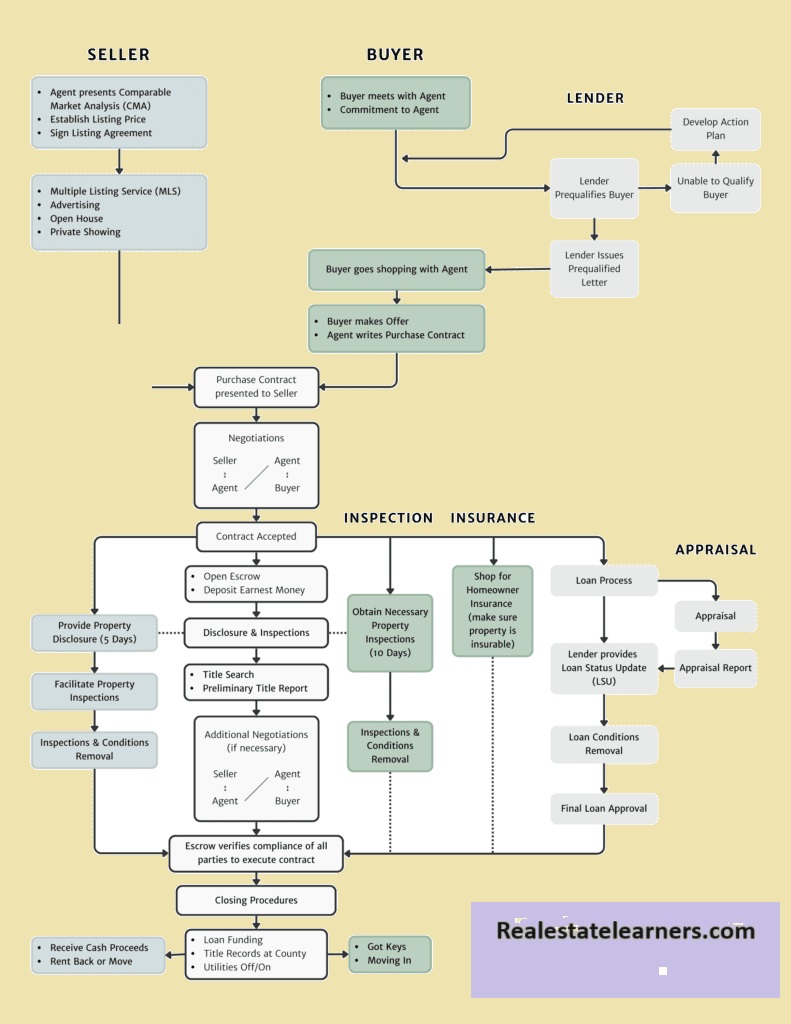Real estate is often seen as one of the best ways to build wealth and financial stability. It offers a unique opportunity for individuals to generate passive income, diversify their investment portfolio, and create long-term value. However, like any other investment avenue, real estate comes with its own set of process and challenges. In this post, we will explore some key considerations about seller to buyer transaction workflow.
Who delivers your offer to the seller framework?
When it comes to buying and selling real estate, there are typically many players involved – the buyer and the seller. As a potential buyer, you may be wondering who is responsible for delivering your offer to the seller.
In most cases, it is the responsibility of your real estate agent or broker to present your offer to the seller. This is because they are the main point of contact between you and the seller, and have a legal obligation to act in your best interest.
The first key player in this process is the buyer’s real estate agent. Their primary responsibility is to represent the buyer and negotiate on their behalf. They work closely with the buyer to understand their needs, budget, and desired terms for the offer. It is important for the agent to communicate effectively with their client and have a clear understanding of what they are looking for in a property. This will help them create an attractive offer that aligns with the buyer’s goals and budget.
The next important role in this framework is the seller’s real estate agent. They act as a liaison between the seller and potential buyers, working to secure the best deal for their client. The seller’s agent has a responsibility to communicate all offers received from potential buyers to their client in a timely manner. They also work closely with the buyer’s agent to negotiate and come to an agreement on the terms of the offer. It is essential for both agents to maintain professionalism and open communication throughout this process.
Another key player in this framework is the seller themselves. They have the ultimate decision-making power when it comes to accepting or rejecting an offer. It is important for sellers to work closely with their agent and be open to considering different offers that may come in. They should also be aware of their bottom line and any non-negotiable terms they have for the sale of their property.
In some cases, a real estate attorney may also be involved in the process. This is especially true if there are legal complexities or specific regulations surrounding the purchase or sale of the property. The attorney’s responsibility is to review all legal documents and ensure that the transaction is compliant with all laws and regulations.
Lastly, a lender or mortgage broker may also be involved in this framework, particularly if the buyer requires financing for their purchase. Their role is to assist the buyer in securing a loan and ensuring that all necessary financial arrangements are in place for the transaction.
Delivering an offer to a seller in the real estate industry requires a well-defined framework that involves multiple players working together. Effective communication, negotiation skills, and understanding of laws and regulations are essential for all individuals involved. By having a clear structure in place, the process can run smoothly and result in a successful transaction for both the buyer and seller. So, it is important to choose your team carefully and ensure that everyone is working towards the same goal of securing the best deal possible for all parties involved.
Tips for Timely Delivery of the Offer
Here are some key things to keep in mind when it comes to delivering your offer to the seller:
Communication is key: Make sure to communicate clearly with your agent about what you want included in your offer and any specific deadlines or requirements. This will help ensure that your offer is delivered accurately and on time.
Be prepared: Before making an offer, it’s important to have all of your paperwork in order. This includes any pre-approval letters, proof of funds, or other necessary documents. Having these ready beforehand will help speed up the process and show the seller that you are a serious buyer.
Consider using electronic delivery methods: With advancements in technology, many real estate transactions can now be completed electronically. This can save time and make the offer process more efficient for both parties.
Follow up: Once your offer has been submitted, make sure to follow up with your agent on a regular basis. They should provide updates from the seller and any necessary changes or counteroffers. This will help ensure that you stay informed throughout the negotiation process.
Real Estate Workflow
In the real estate industry, one of the key aspects of a successful transaction is the delivery of an offer to the seller. This process can often be overlooked or undervalued by buyers, but it plays a crucial role in determining whether your offer will be accepted or rejected.
Listing of Property: When a property is listed on the market, it means that the seller has officially put their property up for sale. This listing is usually done through a real estate agent or broker who acts as the intermediary between the buyer and seller. The listing typically includes details about the property, such as its location, size, features, and price.
Finding the Right Property: As a buyer, it is important to carefully consider your needs and preferences when searching for a property. This will help you narrow down your options and find the right property that meets your requirements. Once you have found a potential property, it is important to conduct thorough research on the property and its neighborhood before making an offer.
The Offer: After finding the right property, the next step is to make an offer to the seller. This is where the delivery of your offer comes into play. It is important to understand that making an offer does not automatically mean you will get the property. The seller has the right to accept, reject or counter your offer.
Delivery of Offer: In order to deliver your offer to the seller, you can either do it in person or through your real estate agent. If you are using an agent, they will handle the process on your behalf and ensure that the offer is presented in a professional manner. In case you are delivering it yourself, it is important to have all the necessary documents and information ready to support your offer.
Framework for Delivering Offer: When delivering your offer to the seller, it is important to follow a framework to ensure that the process goes smoothly. This includes introducing yourself, stating your interest in the property, presenting your offer and any supporting documents, and clearly communicating your terms and conditions. It is also important to remain respectful and professional throughout the process.
Negotiation: After delivering your offer, there may be a negotiation phase where the seller may counter your offer or reject it altogether. In this case, it is important to remain open to negotiation and be willing to compromise in order to reach a mutually beneficial agreement. Your real estate agent can also play a key role in helping you navigate through this process.
Acceptance: If the seller accepts your offer, congratulations! It means that your offer was strong enough and met the seller’s expectations. In this case, there will be a series of legal and financial processes to go through before the property can officially change hands.
Rejection: On the other hand, if your offer is rejected, it is important to not take it personally. There could be a variety of reasons for the rejection, such as the seller receiving a better offer or deciding not to sell their property at all. It is important to remain positive and continue your search for the right property.
Real estate transaction process flow chart:

Conclusion
The delivery of an offer is a crucial step in the real estate transaction process. As a buyer, it is important to understand your role and responsibilities when it comes to delivering your offer to the seller. By following these tips and understanding the general workflow of the real estate industry, you can improve your chances of successfully closing on your dream property.

Corey has over 15 years of experience as a real estate broker and educator. He is dedicated to providing valuable insights and guidance for those looking to enter the real estate industry.
